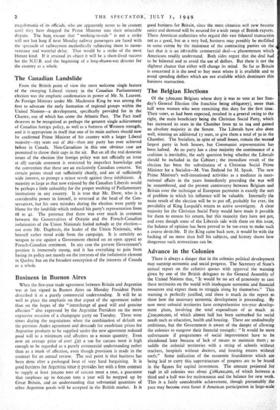Business in Buenos Aires
When the five-year trade agreement between Britain and Argentina was at last signed in Buenos Aires on Monday President Perrin described it as a purely commercial understanding. It will be as well to place the emphasis on that aspect of the agreement rather than on the hopes of the "interchange of good will and genuine affection " also expressed by the Argentine President on the more expansive occasion of a champagne party on Tuesday. There were times during the negotiations when the combination of default on the previous Andes agreement and demands for exorbitant prices for Argentine products to be supplied under the new agreement reduced good will to a minimum and, affection to a minus quantity. Even now an average price of over £97 a ton for carcass meat is high enough to be regarded as a purely commercial understanding rather than as a mark of affection, even though provision is made in the contract for an annual review. The real point is that business has been done after a prolonged bout of very hard bargaining. It is good business for Argentina since it provides her with a firm contract to supply at least 300,000 tons of carcass meat a year, a guarantee that surpluses up to 600,000 tons a year will be mopped up by Great Britain, and an understanding that substantial quantities of other Argentine goods will be accepted in the British market. It is
good business for Britain, since the meat situation will now become easier and demand will be assured for a wide range of British exports. Those American authorities who regard this vast bilateral transaction not as a good, but as a very bad, business may possibly be mollified to some extent by the insistence of the contracting parties on the fact that it is an intvitable commercial deal—a phenomenon which Americans readily understand. Both sides regret that the deal had to be bilateral and to avoid the use of dollars. But there is not the slightest chance that either will change its mind. So far as Britain is concerned it is the need to buy meat where it is available and to avoid spending dollars which are not available which dominates this business transaction.






































 Previous page
Previous page